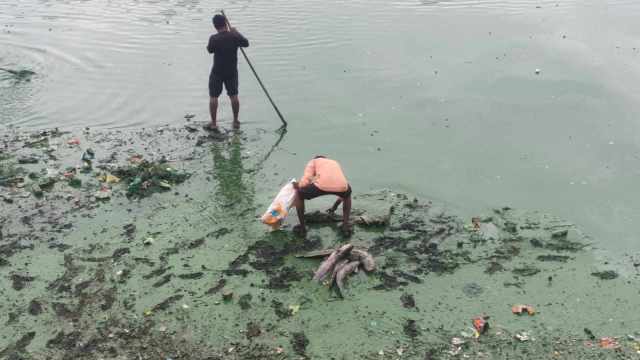Reason unknown: AMC begins cleanup operation days after several dead fish found floating on Asarwa lake
GPCB, FSL, AMC collect water samples, residents cite delayed action by authorities concerned.
 Officials of the AMC's central zone administration began the cleanup operation, removing loads of dead fish and algae layer on the lake, after local residents took up the matter with the municipal commissioner and the Gujarat Pollution Control Board.
Officials of the AMC's central zone administration began the cleanup operation, removing loads of dead fish and algae layer on the lake, after local residents took up the matter with the municipal commissioner and the Gujarat Pollution Control Board.The Ahmedabad Municipal Corporation (AMC) on Saturday began a cleanup operation at Asarwa lake days after a large number of dead fish were found floating on the surface of the water body for the last several days.
Officials of the AMC’s central zone administration began the cleanup operation, removing loads of dead fish and algae layer on the lake, after local residents took up the matter with the municipal commissioner and the Gujarat Pollution Control Board (GPCB).
GPCB Regional Officer (Ahmedabad City) Dr Sweta Patel said that their officials collected water samples from the lake on October 27 and sent them for testing.
While fish deaths have been reported in water bodies such as Sabarmati river and Kankaria lake in the city, no such incident has been reported in Asarwa lake in the recent years, sources said.
A developed and captive water body in Ahmedabad, Asarwa lake, spreads over 32,963 square metres or 3.3 hectares, is the only large water body in the Central Zone of the city.
The fish death was first reported on October 26 and since then, hundreds of dead fish have started floating on the water surface till Saturday, claimed activist Manoj Bhavsar.
After demands, the Ahmedabad Fire and Emergency Services (AFES) had sprayed a tanker of water in the lake on October 27, but after that, no further action had been taken till November 1, Bhavsar said.
Activist Manoj Bhavsar, who reported the matter to the AMC and GPCB, told The Indian Express, “Hundreds of fish have died in Asarwa lake in the past several days, but the administration took no action. I have been trying to draw the attention of AMC officials to the matter since October 27.”
“The lake has not been cleaned for a while. There are only two fountains in the lake to aerate the water, which are not enough, there should be at least eight. However, this is the first time in over 15 years that something like this has happened in the lake. GPCB officials have collected water samples after our complaint,” Bhavsar added.
Dissolved Oxygen (DO) is required to support aquatic life. Oxygen gets into water in three ways – aquatic plants release oxygen during photosynthesis; surface exchange or diffusion from surrounding air and third is water flow. The third method is generally not possible in Asarwa lake as it is a captive water body for most of the year, except monsoon.
A scientific officer in the government said, “A government team visited the lake and prima facie, there was no sign of industrial pollutants in the water. However, there was a thick layer of algae on top of the water. The algae taking more oxygen from the water during night could have led to oxygen depletion in the water, leading to the death of fish. The team also noticed that locals throw garbage and food items into the lake, which could also be a probable cause.”
According to the officer, the sudden temperature drop due to the unseasonal rain might have led to the fish deaths. “It was hot till October 25 and suddenly the weather changed and it became very cold due to the unseasonal rains. Sudden changes in temperature can be harmful to fish,” the officer said.
“However, industrial or other types of pollutant runoff is highly unlikely because this is a captive lake and all the inlets are closed. However, we will know the reason for fish deaths only when the test results are out,” the officer said.
According to sources, it takes about 10-15 days for the GPCB to give its test results. The agency checks Biological Oxygen Demand (BOD), Chemical Oxygen Demand (COD) and Dissolved Oxygen (DO) levels apart from a battery of other tests including the pH level of the water.
Deputy Municipal Commissioner Ramya Kumar Bhatt said, “We have checked the Asarwa lake. The inlets remain locked except for monsoon when the flaps are opened to let stormwater drain into it. We conducted tests and the Biochemical Oxygen Demand (BOD) levels are within the safe range. We are still trying to find the cause of the fish deaths. Meanwhile, the FSL and GPCB have taken water samples from the lake.”
Speaking on the cleanup operation at Asarwa lake, Bhatt said, “We have removed and disposed of the dead fish from the lake. We are cleaning the algae from the lake and carrying out chemical treatment of the water as well.”







